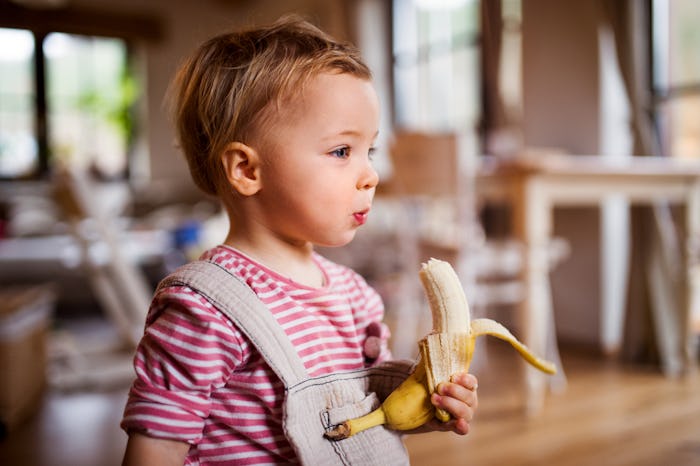Life

Here's How Many Snacks Dietitians Say Your Toddler Should Eat Each Day
Little kids are notorious for munching on whatever they can get their grubby little hands on. Often, a fistful of cereal or a few apple slices is all it takes to appease their growing appetite, but sometimes toddlers eat like they're perpetual garbage disposals. Exactly how many snacks should toddlers eat, though? If your kid is forever begging for extra snacks between meals, is there a point where they're snacking too much?
"Toddlers are growing and may need snacks to fill the gap in their food intake," Niti Patel, a registered dietitian and CEO of Wellness on the Go tells Romper. "There is no exact number of snacks that a child should have during the day, but rather making sure your child has adequate intake of nutrient-dense foods and hydration."
This could mean a mid-morning snack break, a post-lunch pick-me-up, or a quick bite before bedtime, depending on how your day is structured. "For most toddlers, two to three snacks per day is appropriate," Caitlin Waddle, a pediatric dietitian practicing in Atlanta tells Romper.
To help manage the amount of snacking your toddler does, Waddle recommends creating structured meal times with set expectations, as well as limiting grazing all day long, which she says includes continuously drinking milk throughout the day. "We can set our toddlers up for success by letting them know what the expectations are for meals and snacks," Waddle says.
For example, this could mean that meals and snacks are only to be offered in the toddler's high chair, with water offered between meals. "My son is working on communicating his hunger cues with me and starting to go to his highchair to indicate he wants something to eat," Waddle explains.
As a parent, Patel says that while there is no hard and fast number of snacks a toddler is required to have, she tries to make sure every snack counts nutritionally, and often turns to fruit as her go-to. "It's quick, easy, and hydrating," she says. "It is great for toddlers who don’t drink enough water during the day, and it is fiber-loaded and nutrient-dense."
To ensure that your toddler's nutritional needs are met, Patel says parents can focus on offering nutrient-dense options during snack times. "Toddlers are a great age because they eat what you give them," Patel tells Romper. "Focus on giving your child nutrient-dense snacks during the day, and that is what they will want and crave."
If your toddler already balks at every veggie or other food other than crackers that appears on their plate, Waddle suggests continuing to offer options from three to four food groups during meals, and one to two food groups during snacks. "Even if the toddler doesn't enjoy certain fruits or vegetables, it is still great to include them on the plate next to the highly preferred snack," she explains. "Try to pair a fun snack food with a more nutrient-dense food, like Goldfish with fruit or veggie straws with yogurt." Even if your toddler still isn't into what you're serving, she says to try mixing it up and offer more variety by not serving the same snack two days in a row.
But, Patel's ultimate piece of advice for picky toddlers who try to turn down nutritious snacks? Put it in a baggie. "There is something magical about single-serve baggies, and it might just be the magic you need," Patel says.
Experts:
Niti Patel, M.S., R.D., and CEO of Wellness on the Go
Caitlin Waddle, M.S., R.D.N., L.D., Pediatric Dietitian in Atlanta